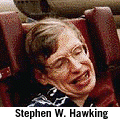Allgemein
Sir
Roger Penrose
Paul Schofield - webmaster@worldofescher.com
Roger Penrose, a professor of mathematics at the University of
Oxford in England, pursues an active interest in recreational
math which he shared with his father. While most of his work
pertains to relativity theory and quantum physics, he is
fascinated with a field of geometry known as tessellation, the
covering of a surface with tiles of prescribed shapes.
http://www.worldofescher.com/misc/penrose.html
Sir
Roger Penrose
Linksammlung zu Leben und Werk von Roger Penrose. In
englischer Sprache.
http://tlc.ai.org/penrose.htm
Sir
Roger Penrose Society
Linksammlung zu Leben und Werk von Roger Penrose. In
englischer Sprache.
http://www.tribunalen.net/srps/SRPSScientists.html
The
Emperor's New Mind
Kelley L. Ross - kross@friesian.com
The Emperor's New Mind
by Roger Penrose may be the best book about modern science yet
written. The range of issues addressed by Penrose is vast,
from Relativity and quantum mechanics, to many questions about
mathematics, and ultimately to important questions about
Artificial Intelligence; and Penrose's authority as one of the
greatest living mathematicians to address these things is
unique. Penrose's thesis, therefore, that Artificial
Intelligence through computers, as presently constructed,
cannot in principle duplicate the workings of the human brain,
and his argument that Einstein was not wrong to express grave
philosophical doubts about quantum mechanics, are given a
weight that they would not have if merely some philosopher, or
anyone else less intimately involved with the mathematical and
theoretical underpinnings of physics, had expressed similar
views.
http://www.friesian.com/penrose.htm
The
Nature of Space and Time
Stephen W. Hawking and Roger Penrose
SCIENTIFIC AMERICAN - Two relativists present their distinctive
views on the universe, its evolution and the impact of quantum theory.
In 1994 Stephen
W. Hawking and Roger
Penrose gave a series of public lectures on general
relativity at the Isaac
Newton Institute for Mathematical Sciences at the University
of Cambridge. From these lectures, published this year by Princeton
University Press as The Nature of Space and Time,
Scientific American has culled excerpts that serve to compare
and contrast the perspectives of the two scientists. Although
they share a common heritage in physics-Penrose served on
Hawking's Ph.D. thesis committee at Cambridge-the lecturers
differ in their vision of quantum mechanics and its impact on
the evolution
of the universe. In particular, Hawking and Penrose
disagree on what happens to the information stored in a black
hole and on why the beginning of the universe differs from
the end.
http://www.sciam.com/0796issue/0796hawking.html
Penrose's
Gödelian Argument
Solomon Feferman - sf@csli.stanford.edu
A Review of Shadows of the Mind by Roger
Penrose:
In his book Shadows
of the Mind [SOTM below], Roger Penrose has turned in
another bravura performance, the kind we have come to expect
ever since The Emperor's New Mind [ENM] appeared. In
the service of advancing his deep convictions and daring
conjectures about the nature of human thought and
consciousness, Penrose has once more cut a wide swath through
such topics as logic, computation, artificial intelligence,
quantum physics and the neurophysiology of the brain. While
the aims and a number of the topics in SOTM are the same as in
ENM, the focus here is much more on the two axes Penrose
grinds in earnest. Namely, in the first part of SOTM he argues
anew and at great length against computational models of the
mind and more specifically against any account of mathematical
thought in computational terms. Then in the second part, he
argues that there must be a scientific account of
consciousness but that it will require a (still to be found)
non-computational extension or modification of present-day
quantum physics.
http://psyche.cs.monash.edu.au/v2/psyche-2-07-feferman.html
Symposium
on Roger Penrose's Shadows of the Mind
David Chalmers - patrickw@cs.monash.edu.au
In his book Shadows of the Mind, Roger Penrose
suggests that deep problems in artificial intelligence,
physics, and the philosophy of mind are closely connected. He
presents a detailed argument, using Gödel's theorem, for the
conclusion that human thought cannot be simulated by any
computation. This leads him to the conclusion that physics is
noncomputable, and he presents suggestions about how
noncomputability may enter into a theory of quantum gravity.
Finally, he argues that this may take effect at the level of
the mind through quantum collapse processes in microtubules,
protein structures found in the skeleton of a neuron.
In this
symposium, nine researchers in computer science, philosophy,
psychology, mathematics, and molecular biology address
Penrose's positions at some length, concentrating on his Gödelian
arguments against artificial intelligence and on his proposal
that quantum processes in microtubules are essential to the
functioning of the mind. The commentaries are followed by a
reply by Penrose.
http://psyche.csse.monash.edu.au/psyche-index-v2.html
Schrödinger's Cat in Space
Roger Penrose
Audio Lectures in Physics on the Web
A very enjoyable talk, which comes complete with all those
great Penrose drawings. The talk is primarily focused on
approaches to time asymmetry in quantum gravitational theories.
Rather than starting from a theory-up approach, this looks for
cracks in standard quantum mechanics and general relativity
which could let us understand where time asymmetry could
spring from. The talk is not very mathematical, but if you're
not a student of physics, it may be hard to follow the reasons
for what he says. Familiarity with the need for quantum
gravity helps. A familiarity with non-relativistic quantum
mechanics, general relativity and cosmology is needed.
http://cosmos.nirvana.phys.psu.edu/online/Html/Seminars/Fall1999/Penrose/
Science
and the Mind
Roger Penrose
A slide show with comentary audio talk.
http://online.itp.ucsb.edu/online/plecture/penrose/
Einstein's
Equation and Twistor Theory: Recent Developments
Roger Penrose
A slide show with comentary audio talk.
http://doug-pc.itp.ucsb.edu/online/gravity99/penrose/

|



